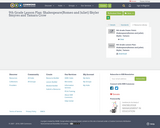
- Subject:
- Arts and Humanities
- Material Type:
- Lesson Plan
- Author:
- Skyler Smyres
- Tamara Crow
- Date Added:
- 01/15/2018


Sometime after 1492, the concept of the New World or America came into being, and this concept appeared differently - as an experience or an idea - for different people and in different places. This semester, we will read three groups of texts: first, participant accounts of contact between native Americans and French or English speaking Europeans, both in North America and in the Caribbean and Brazil; second, transformations of these documents into literary works by contemporaries; third, modern texts which take these earlier materials as a point of departure for rethinking the experience and aftermath of contact. The reading will allow us to compare perspectives across time and space, across the cultural geographies of religion, nation and ethnicity, and finally across a range of genres - reports, captivity narratives, essays, novels, poetry, drama, and film. Some of the earlier authors we will read are Michel Montaigne, William Shakespeare, Jean de Léry, Daniel Defoe and Mary Rowlandson; more recent authors include Derek Walcott, and J. M. Coetzee.
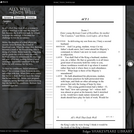
The Folger Shakespeare Library provides the full searchable text of "All's Well That Ends Well" to read online or download as a PDF. All of the lines are numbered sequentially to make it easier and more convenient to find any line.
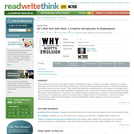
Students compare attending a performance at The Globe Theater with attending a modern theater production or movie. They then create a commercial for an Elizabethan audience promoting a modern product.
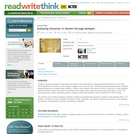
Students create epitaphs for characters from a tragedy, such as "Hamlet".
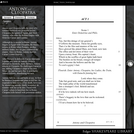
The Folger Shakespeare Library provides the full searchable text of "As You Like It" to read online or download as a PDF. All of the lines are numbered sequentially to make it easier and more convenient to find any line.
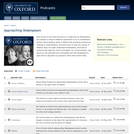
Each lecture in this series focuses on a single play by Shakespeare, and employs a range of different approaches to try to understand a central critical question about it. Rather than providing overarching readings or interpretations, the series aims to show the variety of different ways we might understand Shakespeare, the kinds of evidence that might be used to strengthen our critical analysis, and, above all, the enjoyable and unavoidable fact that Shakespeare's plays tend to generate our questions rather than answer them.
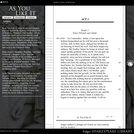
The Folger Shakespeare Library provides the full searchable text of "All's Well That Ends Well" to read online or download as a PDF. All of the lines are numbered sequentially to make it easier and more convenient to find any line.
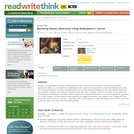
Is the case closed on the authorship of Shakespeare's plays? Student history detectives explore the evidence for and against one of the possible alternatives, Edward deVere, using the novel Shakespeare's Secret plus a variety of online sources.
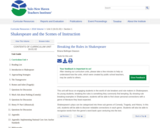
This unit will focus on the transgressive behavior of characters from some of Shakespeare’s most famous plays and how we can identify with those actions. This unit is designed to help students bridge the gap between Shakespearean literature and modern life. Many times we find ourselves saying the wrong thing to someone, something that might sound offensive; and even if we didn’t mean it, the next necessary step is to consider how we get out of that situation. In modern life, we create transgressive behavior just as did Shakespeare’s characters. The plays we will focus on in this unit are Romeo and Juliet, Much Ado About Nothing, and Henry IV part 1. Students will be asked to identify the transgressive behavior, to discuss the significance of who owns it, how he or she got into the situation, and how the scene might alternatively play out. Students will be asked to create parallel moments in contemporary contexts and to incorporate the Shakespeare line in their alternative contexts. This unit will suggest the use of vocabulary lists per each play, summaries of each story, character maps, as well as background information on the writer himself.
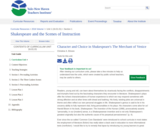
Readers, young and old, can learn about themselves by vicariously facing the conflicts, disappointments and triumphs lived out by the fascinating characters they encounter in literature. Shakespeare’s plays remain popular because they so evocatively and powerfully portray our human experience, as we live it today. That exposure to this mysterious, dynamic quality of life that allows us bravely to face conflicts and creatively learn from our mistakes is one of the most important lessons that we need to begin to teach our children.
Through the use of select children’s books and simplified versions of the well-known ‘three caskets scenes’ in the play, The Merchant of Venice, students will gain a familiarity with its fairy-tale-like storyline. The focus will be on the challenge that Portia’s suitors face in the context of this moral trial during which the suitors will have the rare opportunity to look beyond mere appearances in making their choices. But will they take a risk and do that? In these scenes we will look at how the choice of each of the suitors reflects his own character and decides his ultimate destiny.

This course is designed around analyzing what’s so funny and why is it that we laugh when we do. How is comedy characterized on the fictional page, the screen, and the stage? And what might the comic teach us about the self and culture(s), especially when we come to understand its patterns of transgression as confounding social norms through jokes and laughter? Tracking a history of comedy, beginning with the first Greek humorists, Aristophanes and Plautus, we will traverse genres, periods and cultures to reflect on various types of humor: satire, farce, slapstick, love, tragedy, parody, and screwball.
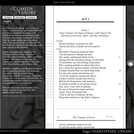
The Folger Shakespeare Library provides the full searchable text of "The Comedy of Errors" to read online or download as a PDF. All of the lines are numbered sequentially to make it easier and more convenient to find any line.
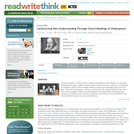
After reading "The Tempest" or any other play by William Shakespeare, students work in small groups to plan, compose, and perform a choral reading based on a character or theme.
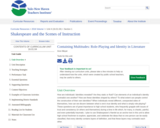
This unit focuses on how characters’ identities are constructed in text. When we read, how do we know that a character is acting or speaking according to his or her true nature? When are those actions or speech the result of a role that has been assumed? Using Shakespeare’s Hamlet as an anchor text, students will explore these questions at length in order to analyze the central character. This unit will allow students the opportunity to differentiate between an individual’s (relatively) permanent identity and the various parts that same individual might play in various situations. As they read the play, students will constantly reevaluate Hamlet based on specific lines and interactions with other characters. Under what circumstances does the prince reveal himself truthfully, and why?
This study is particularly relevant to high school students, who often grapple with issues of identity and to reconcile actions and speech that may seem to contradict one’s true nature. By closely examining the variety of ways in which Hamlet can be read as a character, students will develop an understanding of how to regard personality as a multifaceted quality.
Concurrently, students will conduct an investigation of a character in an independent reading book using the same framework. How does this character display his or her true nature in certain situations, and how does he or she assume temporary roles elsewhere? This independent study, along with the class-wide examination of Hamlet , will provide the foundation for students’ performance tasks for this unit. Students will write a paper in which they explain the difference between role playing and establishment of true identity. Using evidence found in Hamlet and their chosen independent reading book, each student will conduct a deep analysis of how an individual may assume several roles to achieve a desired goal, while also maintaining a separate, stable identity.

Conversations host Harry Kreisler welcomes Annabel Patterson, Professor Emeritus of English, Yale University for a discussion of her career as a literary scholar. The discussion focuses on the challenges of understanding literature in its historical and social context. Her work on censorship, Shakespeare, and her current research on the use of words in the American political dialogue are some of the topics addressed in the conversation. (59 minutes)
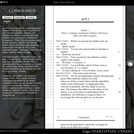
The Folger Shakespeare Library provides the full searchable text of "Coriolanus" to read online or download as a PDF. All of the lines are numbered sequentially to make it easier and more convenient to find any line.
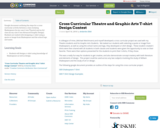
Google document outlining the steps for a cross curricular activity between a class studying Shakespeare (in my case it was Theatre) and an Art class (in my case it was Advanced Graphic Design). Students are tasked with designing a
t-shirt using a quote or image from Shakespeare and the school logo and name.
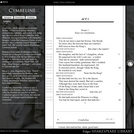
The Folger Shakespeare Library provides the full searchable text of "Cymbeline" to read online or download as a PDF. All of the lines are numbered sequentially to make it easier and more convenient to find any line.
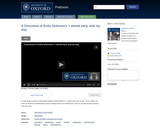
Dr Sally Bayley presents an illuminating reading of Emily Dickinson's 'I started early, took my dog'. In her reading, she seeks out allusions to Shakespearean plays including Hamlet and The Merchant of Venice. She then answers questions about the poem. This audio recording is part the Interviews on Great Writers series presented by Oxford University Podcasts.